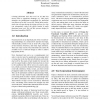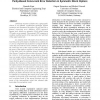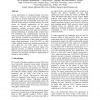93
Voted
ITC
2003
IEEE
15 years 8 months ago
2003
IEEE
Current-based tests are the most effective methods available to detect resistive shorts. Delta IDDQ testing is the most sensitive variant and can handle off-state currents of 10-1...
213
click to vote
ITC
2003
IEEE
15 years 8 months ago
2003
IEEE
This paper describes a new post-silicon validation problem for diagnosing systematic timing errors. We illustrate the differences between timing validation and the traditional log...
ITC
2003
IEEE
15 years 8 months ago
2003
IEEE
Creating functional tests that work on an ATE has always been a significant challenge [1]. This paper identifies the fundamental mechanisms for functional test failures of an SOC ...
ITC
2003
IEEE
15 years 8 months ago
2003
IEEE
110
Voted
ITC
2003
IEEE
15 years 8 months ago
2003
IEEE
Deliberate injection of faults into cryptographic devices is an effective cryptanalysis technique against symmetric and asymmetric encryption. We will describe a general concurren...
ITC
2003
IEEE
15 years 8 months ago
2003
IEEE
This paper describes an Addressable Shadow Protocol device that is capable of providing connectivity between a backplane resident IEEE 1149.1 test bus master and a plurality of 11...
68
Voted
ITC
2003
IEEE
15 years 8 months ago
2003
IEEE
Many of the semiconductor technologies are already facing limitations while new-generation data and telecommunication systems are implemented. Although in its infancy, superconduc...
111
click to vote
ITC
2003
IEEE
15 years 8 months ago
2003
IEEE
As the performance of Analog-to-Digital Converters continues to improve, it is becoming more challenging and costly to develop sufficiently fast and low-drift signal generators th...
ITC
2003
IEEE
15 years 8 months ago
2003
IEEE
Energy Consumption Ratio (ECR) test, a current-based test, has shown its ability to reduce the impact of process variations and detect hard-to-detect faults. The effectiveness of ...
112
click to vote
ITC
2003
IEEE
15 years 8 months ago
2003
IEEE
A delay-locked loop (DLL) based built-in self test (BIST) circuit has been designed with a 0.18 µ m TSMC process (CM018) to test chip I/O speeds, specifically, the setup and hold...






